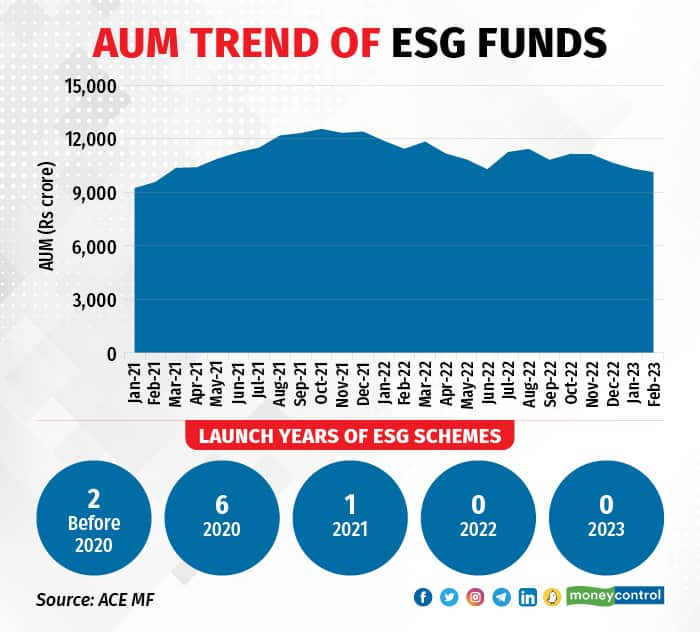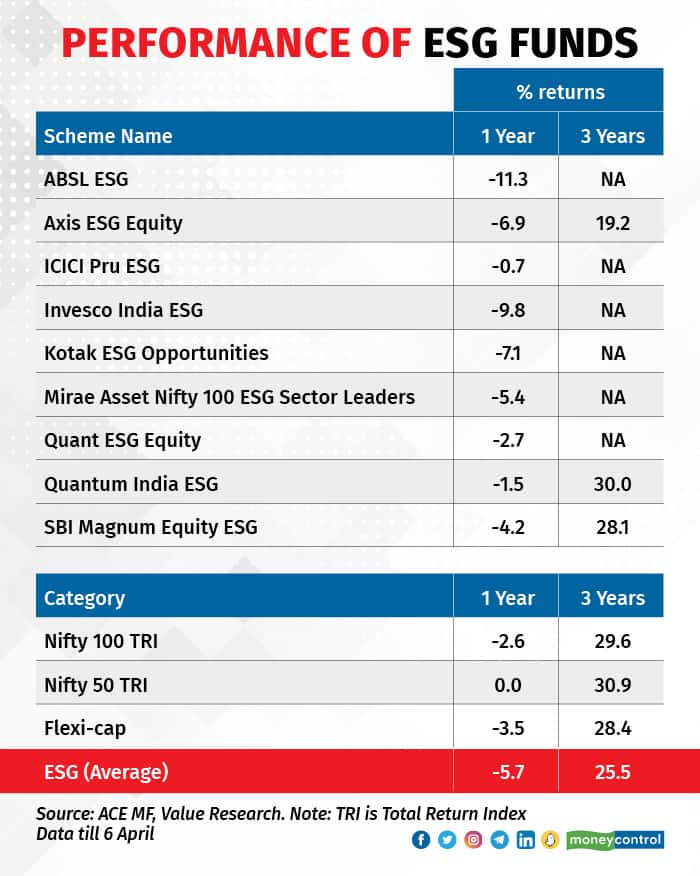



On March 29, capital market regulator Securities and Exchange Board of India (SEBI) made it mandatory for listed companies to make their Environmental, Social and Governance (ESG) performance public. At the same time, it introduced a new category of mutual funds (MFs), called the ESG category, allowing funds to launch more than just one ESG fund.
SEBI’s thrust on ESG might just come as a blessing for ESG-specific MF schemes that started out with much promise during the coronavirus pandemic but have since failed to attract retail investors. Over the last few months ESG funds have actually seen outflows.
But back in 2020 when the coronavirus pandemic spread across the globe, a growing need was felt among investors to invest in ‘responsible’ companies. As a result, from just two ESG-based funds at the beginning of 2020, the number grew to eight by the end of that year.
Further, assets under management (AUM) tripled from Rs 2,749 crore at the end of January 2020 to Rs 9,236 crore till January 2021, as per data available with ACE MF.
Also see: The complete MC30 basket of mutual fund schemes
In the global context, PwC’s Asset and Wealth Management Revolution 2022 report stated that ESG-related AUM may rise to $33.9 trillion by 2026, from $18.4 trillion in 2021.
However, with the pandemic gone, investors are back to focussing on funds that give high returns, ESG or no-ESG. After six new fund offers (NFOs) in 2020 and one in 2021, no new fund has been launched based on the ESG-factor since March 2021.
So, can SEBI’s push revive the fortunes of ESG funds?
SEBI’s vote of confidence
The use of ESG ratings is growing, as investors increasingly factor these parameters in their investment decisions. In this backdrop, SEBI has felt a need to streamline ESG disclosures, ratings as well as investing.
SEBI recently allowed MF houses to launch multiple schemes on ESG-related factors.
Further, in order to enhance the reliability of ESG disclosures, the capital markets regulator will introduce BRSR Core, which will contain a limited set of Key Performance Indicators (KPIs), for which listed entities will need to obtain reasonable assurance.
BRSR or Business Responsibility and Sustainability Report requires listed companies in India to disclose information under the nine principles of the National Guidelines on Responsible Business Conduct.
SEBI had mandated the top 1,000 listed companies (by market capitalisation) to make ESG disclosures as per BRSR from financial year 2022 (FY22) on voluntary basis, and mandatory from FY23.
Now, BRSR Core is expected to further increase transparency and ensure greater reliability of ESG disclosures.
Also read | MC Explains: What is property tax & what happens if you don’t pay it on time
“SEBI is looking to make company-level sustainable disclosures more granular as well as provide greater accountability. Similarly, greater disclosures for ESG funds help investors make informed choices about the intended sustainable approach the fund is taking,” said Kaustubh Belapurkar, Director-Manager Research, Morningstar Investment Adviser India.
ESG fails to dazzle
The first sustainable fund in India is SBI Magnum ESG, as it was re-categorised as an ESG fund in June 2018.
Data shows that the highest AUM under this category was seen in October 2021 at Rs 12,553 crore, which has come down to Rs 10,127 crore as of February end.
 .
.
Even on the returns parameter, ESG funds have failed to create waves. On average, ESG funds have delivered negative 6 percent and 25 percent returns on a one and three-year basis. In comparison, the Nifty 50 Total Return Index (TRI) and Nifty 100 TRI have delivered around 1 percent and 32 percent, as well as negative 2.6 percent and 30 percent returns, respectively, for similar periods.
Even diversified flexi-cap funds, which invest across large-, mid- and small-cap market caps have performed better on average than ESG funds.
Also read | MC30: New champions - schemes that made a fresh entry into the best MF list in 2023
“The volatility in equity markets over the past year or so due to adverse macroeconomic developments such as geopolitical crises, rate hikes, inflation, and corporate governance worries has led to a loss of momentum for the ESG funds category,” said Piyush Gupta, Director – Funds Research, Crisil Market Intelligence and Analytics.
Lack of push from institutional investments — unlike that of pension and sovereign funds globally — and lack of awareness about ESG funds among investors in the country are also to blame.
“Additionally, the lacklustre performance of ESG funds themselves has reduced investor interest,” he said.
The diversification factor

There are 10 ESG-factor-based funds in India. Of these, eight are active funds, one an exchange-traded fund (ETF), and one a fund-of-funds (FoF).
Data from ACE MF shows that ESG funds are mainly focused on two sectors. While on average these funds have 27 percent exposure to financial companies, including banks, 17 percent exposure is to information technology (IT) companies.
At the combined level, these two sectors command 44 percent exposure in ESG funds, bringing in concentration risk.
“There is some cyclicality involved in sector performance over the last couple of years. Usually, despite being well diversified, ESG funds have low allocation to energy companies, as they belong to the carbon-intensive sector. During the energy crisis last year, most of these companies performed better. So, that could also have led to the underperformance of ESG schemes. However, in 2021, these funds were doing much better than the conventional indices or the funds,” said Chirag Mehta, Chief Investment Officer, Quantum Asset Management Company.
Also read | 14 mid-cap stocks held by mutual funds yet to unlock their potential. Do you own any?
Experts feel that technically there should not be any concentration risk in ESG funds as sustainable funds are not sectoral or thematic funds. ESG parameters are mostly sector or theme agnostic.
“ESG is just a set of parameters to assess companies. Hence a portfolio built in ESG will have wide range of sectors. So, the risk of such funds being concentrated should not arise. Of course, a fund manager may or may not choose to make a fund concentrated with stock bets. That is true of any fund portfolio,” said Vidya Bala, Co-founder of PrimeInvestor.in.
ESG funds a must have?

Not managing ESG risks well could have a significant financial impact on the business with A potential loss of revenue, fines and an impact on the brand.
“ESG fund managers look to buy companies that are managing their ESG risks well or companies that are migrating towards better managing ESG risks. Many domestic fund managers are already using ESG risk factors in their evaluation of companies,” said Belapurkar.
According to Bala, ESG funds are imminently skippable in investors’ portfolios.
“Stock picking involves looking at various parameters, including sustainability of earnings, growth and business moat. It also requires an assessment of governance. Regulatory issues, environmental impact, and the company's business risk also come into play. A fund manager already uses these parameters for building any equity portfolio. Therefore, there isn't any need to have a separate ESG category by itself. The category's performance is also nothing to write home about,” she said.
The way forward
SEBI’s proposal to allow AMCs to launch multiple funds in the ESG space, compared with the current restriction of one fund per fund house, is expected to give a boost to fund launches and innovation in the category.
“The fund launches will, however, need to be backed by the performance of the funds and initiatives to raise investor awareness on the benefits of ESG investing,” said Gupta.
Also read | Beyond health cover: How employers can widen their insurance bouquet for employees
Experts are of the view that going ahead, the industry will witness ESG factors being embedded into the overall investment processes, and not just be specific to sustainable funds.
To promote ESG-based investing, Mehta believes that a combination of tax breaks and awareness would make a big difference. “I think, for a country like India, sustainable finance is very critical,” he said.
Discover the latest Business News, Sensex, and Nifty updates. Obtain Personal Finance insights, tax queries, and expert opinions on Moneycontrol or download the Moneycontrol App to stay updated!
Find the best of Al News in one place, specially curated for you every weekend.
Stay on top of the latest tech trends and biggest startup news.